- Home
- Amanda Flower
The Final Tap Page 2
The Final Tap Read online
Page 2
Judy looked down at her hands as if she’d just realized what she was doing. She dropped them to her sides. “Pansy Hooper was just here.”
I groaned. “What did she want?”
Judy shook her head. “To complain about all the noise on the Farm.”
“Noise?” I asked, even though this came as no surprise.
Pansy Hooper was our closest neighbor to the Farm. Her family owned a little home in the woods about a half mile from the Farm’s historical village. Milton Hooper, her father, had lived in that house for decades and never complained about anything. After he died, Pansy and her two teenaged sons had moved into the family home. Since arriving in January, Pansy has done nothing but complain about the Farm. She’d gone as far as to report our noise to the town council. They were shaping up to be the neighbors from hell, something I didn’t think I’d have to deal with at Barton Farm. The worst part was, it was the off-season for Barton Farm and she already thought we were too loud. Heaven knew what she would say or do when we started shooting off cannons during the Civil War reenactment in the summer.
I shook my head. “I’ll deal with her later. I have to find Dr. Beeson.”
Judy wrinkled her nose. Apparently, she was as much a fan of Beeson as Benji was.
“Have you seen Dr. Beeson?” I repeated my original question, looking around the visitor center at the polished floors and exposed wooden beams. Although the center was built to resemble a lodge from nineteenth-century pioneer days in Cuyahoga Valley, it was very much a modern building constructed fifteen years ago. Its Wi-Fi and sliding glass doors gave it away. “I thought he was coming back here to the visitor center.”
“He did come in, but he was only here for a few minutes before he stormed off again, mumbling something about the red maples on the other side of the pasture,” Judy said.
In unison, the three of us turned around and stared through the sliding glass doors. We could see the wide pasture lands that bordered the woods along the northern edge of Barton Farm. On this side of the Farm, west of Maple Grove Lane, we had my cottage, the sugar maple groves, the visitor center, the pasture for the oxen, and a handful of outbuildings. On the east side of the Farm was the village, where from May to October my first-person historical interpreters acted out nineteenth-century history as if they were living in 1863. I’d arranged to have a few of my top interpreters—including my best friend Laura Fellow, a high school history teacher—on the grounds near the visitor center Saturday and Sunday, dressed in character for the Maple Sugar Festival. Meanwhile, Gavin would be in the sugarhouse, demonstrating how maple sugar is boiled down to maple syrup, and the Civil War reenactors would be on hand to provide their stories about maple sugar during the war to anyone who asked.
“Beeson must have been moving pretty fast if we didn’t see him when we walked back here,” Benji said. “We were only a few minutes behind him, and I didn’t see anyone crossing the field. Did you, Kelsey?”
I shook my head. “Did he say what was so important about the red maples?” I asked Judy.
She brushed her hands on her long khaki skirt. Judy always wore a khaki skirt. I imagined she had an entire closet of them at home.
“He muttered something about the trees being ready,” she said.
I frowned. “I guess that’s possible. Dr. Beeson was furious that all our sugar maples are frozen solid, so it sounds to me like he thinks the red maples will be ready to tap. He’s adamant on the point that he wants to tap a tree that’s already running for his class.” I frowned. “But those red maples won’t do. They’re quite a hike from the Visitor Center, and most of the people attending his class are retirees.”
“I told you electric blankets will solve everything,” Benji said.
“Electric blankets?” Judy asked.
“Ignore her,” I said.
“Not to mention that the oxen wouldn’t like people tramping back and forth across their pasture,” Benji said. “The only person they tolerate is Barn Boy.”
“Please call our farmhand Jason,” I said automatically.
“I’ll try to remember,” Benji said. Her tone told me that she would soon forget that promise.
“Should we go after him?” Judy asked.
“You can’t,” I said. “You need to stay here for when the school children arrive. Benji and I will go. We shouldn’t be gone long.”
Judy gave me a “yeah right” look.
I frowned and wondered what that was about, but I didn’t have time to ask. I needed to be back at the visitor center in time for the school visit.
Benji pulled her hat down over her ears. “Let’s get this over with, and just an FYI, I might put in for hazard pay. I’ve already lost my toes. My fingers may be next.”
I rolled my eyes, knowing that she was kidding. Before Benji was my permanent assistant, she was the Farm’s brickmaker. If there was any reason to put in for hazard pay it would be that. Making bricks by hand was hot and dangerous work, and Benji had the scars from wasp stings on the soles of her feet to prove it.
Benji and I walked out the sliding glass doors. I looked down at Dr. Beeson’s obvious tracks in the snow. “At least the snow is good for something. He’ll be easy to find.”
Before crossing the pebbled path, we waited for the horse-drawn sleigh to come to a halt in front of the visitor center. It would give the children sleigh rides after the maple sugaring presentation. Since the ground was still frozen, we’d kept the sleigh out, but Jason, the farmhand, had our large wagon ready to go if the ground started to thaw. The Farm’s two draft horses, Scarlett the mare and Rhett the gelding, stood at the front of the sleigh stomping their hooves. Scarlett bumped her head against Rhett. She was the one in charge and everyone knew it.
My master gardener, Shepley, sat in the sleigh’s driver seat. Shepley was the resident grouch of Barton Farm—a title I would have assigned to Dr. Beeson, if only by a few points, had Beeson been a full-time employee. Despite the cold, Shepley wasn’t wearing a hat. His long gray hair was tied back at the nape of his neck with a piece of leather. He wasn’t my first choice to entertain children—actually, to entertain anyone—but he was the one person available. I’d hoped that Jason would step up and drive the sleigh, but he became anxious in a group of more than two people. Four dozen kids would make him run for the woods.
I stepped up to the sleigh. “Shepley, did you see Dr. Beeson walk by here on his way across the pasture? He’s the maple sugar expert teaching tomorrow’s class,” I added for clarity.
Shepley scowled in return. “Did you lose him? I do almost everything on this Farm, but is it my job to keep track of your experts too?”
I sighed, not bothering to argue. There was no point in getting Shepley riled up before he faced all those impressionable children. I shivered to think what he would say. I went over to Benji, who was waiting for me at the split-rail fence that surrounded the pasture.
“Just ignore him,” she said reasonably. She grunted as she climbed over the fence. I followed. The Farm’s two oxen, Betty and Mags, stared at us as we trudged across their pasture in the snow. Steam puffed out of their nostrils and mouths and reminded me of the bison I’d seen in the early morning when I camped in Yellowstone National Park while in college.
“Just so you know, if those two charge you’re in trouble,” Benji said. “I ran track in high school, and I can outrun you.”
I frowned. “Thanks.”
On the other side of the field, Benji and I climbed the fence, but that’s where Beeson’s tracks ended. “Where did his footprints go?” I asked. “It hasn’t snowed in the last twenty minutes, so they can’t be covered.”
She pulled her stocking cap farther down on her ears. “Alien abduction is my theory.”
I studied the ground. “This is weird.”
“What?” She looked down too.
I pointed. “It looks like
brush marks in the snow. It’s almost like someone used a pine bough to erase the footprints.”
“Why would anyone do that? There isn’t anything out here but a bunch of trees.”
We followed the brush marks deeper into the trees and found a person lying at the foot of a maple. He wasn’t moving, and some of the snow around him was stained red. A sinking feeling washed over me as Benji and I inched forward. Neither of us said a word.
At our feet, Dr. Conrad Beeson lay on his side, the hand drill sticking out of his chest.
three
Benji and I gaped at the fallen man for a full minute before either one of us came to our senses.
Benji found her voice first. “Is—is he dead?”
He certainly looked dead.
I shook my head, and then crisis mode kicked in. I knelt next to Dr. Beeson and placed a finger to his neck, leaning close to his face. I felt a pulse. It was faint but there. “He’s still alive. Call 911!” I ordered Benji.
She yanked her cell phone from her coat pocket and made the call. I heard her rattle off the address for the Farm.
“They’re on their way,” she said. She held the phone away from her ear. “They told me to stay on the line.”
“Okay, do that and run back to the visitor center and tell them what’s going on. You’ll have to direct the ambulance here too.”
She hesitated. “You want me to leave you here with him?”
“Yes! Go! You have to tell Gavin and Judy what’s going on. The school group will be here any minute. It would be best if Gavin took the children to the sugarhouse first to keep them out of the way of the paramedics.”
Benji shook her head as if clearing away some cobwebs. “Right!” She took off for the visitor center. She hadn’t been kidding when she said she could run fast.
After the sound of her footsteps in the snow faded away, I turned back to the injured man. I wasn’t a medical professional, but I knew he didn’t have much time if help didn’t arrive soon. As much as it pained me to see him lying there with the drill sticking out of his chest, I knew not to remove it. The risk was too great that I would cause more damage by removing the drill bit, and it would only make his bleeding worse. The drill stuck out of the left side of his chest. I hoped that meant it had missed his heart, not that an injured lung was so much better.
I leaned close to his face. “Help’s on the way, Dr. Beeson. You’re going to be okay.” I didn’t know he would be okay, and I didn’t know if he could hear me. It seemed to be the right thing to say. When my mother had been in hospice before she died, the nurses had told me to talk to her even when she could no longer respond. They said she could hear me, and it would help her. I still didn’t know if it helped my mother. I might never know, but talking to her during those last, long—but at the same time fleeting—hours had helped me. It gave me a chance to say everything that I’d needed her to hear.
If Beeson died out here in the freezing snow, his family would never have the chance to do that.
I squeezed his hand. “Help is on the way.”
I was so glad my son Hayden was at school, and that he wasn’t one of the children who would be visiting the Farm for the field trip. Had he been, he would have insisted on being with me the entire time. I didn’t want him to see this. I’d been able to shelter him from what had happened during the Civil War reenactment last summer, and I planned to do that again.
The wail of sirens broke through the frozen air. I let out a breath I hadn’t known I was holding, and it came out in a white puff.
“They’re almost here,” I said in my best upbeat voice.
“Th-they … ” the professor whispered. His eyes were still closed.
Maybe I imagined that I heard it. I leaned close, just in case. “They who?”
“Th-they did …”
“Did what? Did someone do this to you? Can you tell me who?”
“Th-they.”
There was the sound of people running and crashing through the trees. I ignored the noise of the approaching voices and focused all my attention on the professor. “They who? Please tell me.”
“Th-they,” he said through parched lips.
“EMS!” someone cried.
“They’re over here,” I heard Benji shout.
Benji and three EMTs broke through the trees. The first of the EMTs was Chase Wyatt, a sometime–Civil War reenactor who I’d met the previous summer during Barton Farm’s reenactment.
Since the reenactment, we’d developed a friendship, but I knew that Chase wanted it to be something more. He’d asked me out on a date more than once since the reenactment ended in July. So far, I’d been able to avoid giving him a direct answer. I wasn’t sure that I was ready to bring another adult into Hayden’s life. My five-year-old just had his father’s engagement to twenty-something Krissie Pumpernickle sprung on him, and the thought of a new stepmother was a lot for a kid to handle. I didn’t want to bring up the possibility of a new stepfather—even though Chase and I were nowhere near that—this close to his father telling him about his upcoming wedding. I needed to protect my son from being hurt again.
My best friend, Laura, would argue that I wasn’t protecting Hayden. I was protecting myself. I hadn’t been on a single date since the divorce was finalized three years ago. A tiny part of me would admit only to myself that I thought she might be right. I’d never tell Laura that. She would hold it over me for the rest of my life and into the hereafter. But I had good reason to want to protect myself. Hayden’s father, Eddie, had been unfaithful. I could not go through that again.
Despite all my logical thoughts about why dating Chase was a terrible idea, I felt my cheeks grow hot when he made eye contact with me. If I was asked, I planned to blame my blush on the harsh winter wind.
Chase wore a black hip-length ski jacket over his navy uniform and sturdy snow boots that looked like they were used for hiking or kicking in doors. “Are you okay?” he whispered as he kneeled next to me.
I gave him the slightest of nods. “Dr. Beeson isn’t great.”
He saw the drill sticking out of the man’s chest and winced. As he did so, he checked Beeson’s pulse. “He’s still alive, but we don’t have much time.” He waved over his colleagues and they placed a fold-up stretcher on the snow. “Kelsey, I’m going to have to ask you to back up.”
I stumbled to my feet and shuffled back to where Benji stood on the edge of the trees. As I did, a young police officer—Officer Sonders, who I’d met the last time someone died on the Farm—broke through the trees. He nodded to me. “What happened? Has there been a crime?”
“I don’t know,” I managed to say. I nodded to Dr. Beeson and the EMTs kneeling around him.
He shuddered. “I’d better call this in.” He stepped away from Benji and me and removed his radio from his belt.
“He’s a big guy,” one of the other two EMTs said. “How are we going to carry him out? The snow’s too deep to pull the ambulance into the woods. It’ll get stuck for sure.”
“Pull the ambulance around as close as you can get it to the tree line on this side of the pasture, and we will have to carry him that far,” Chase said. “Sonders can help.”
“Benji and I can help too,” I said.
My assistant nodded. Her dark skin had a gray cast to it.
One of the EMTs moved off toward the pasture to move the ambulance into position, and the other knelt beside Chase to stabilize Beeson for transport.
“Are you okay?” I whispered to Benji.
She swallowed. “I’ve never seen anything like this.”
“Me either,” I admitted. “Chase and the other EMTs will take care of him. He’ll be okay.”
Benji twisted her mouth as if she wasn’t so sure about that. I had to agree with her. I knew Chase and the others would do everything they could for the professor, but it was hard to beli
eve he would survive his injury.
The EMTs gently rolled Beeson onto the stretcher. Chase placed an oxygen mask over his face and tightened the straps around his body so that he wouldn’t fall off the board.
“Are you going to leave that drill sticking out of his chest like that?” Benji’s voice was accusing.
Chase’s dark eyes glanced at us for half a second. “The surgeons will remove it at the hospital. If we do it here, he might bleed to death.”
Benji’s face grew a shade grayer.
“He was trying to tell me something,” I said. “I think he was trying to tell me what happened.”
“There’s no time to find out now,” Chase said. “We have to get him to the hospital.”
I swallowed. “Just tell us what we need to do.”
He smiled. “You’ve done well so far. He’s still alive.”
That was small comfort. Even I could tell the maple sugar expert was in serious trouble.
The EMT who’d run for the ambulance appeared in the woods. “We’re ready to move.”
“Good.” Chase raised his voice. “Sonders, we need you too.”
The officer joined them at the stretcher as Chase signaled Benji and me to come forward. He directed us where to grab the stretcher. “All right, on the count of three, we lift. One … two … three!”
With a Herculean effort, we hoisted Dr. Beeson from the frozen ground. He made the faintest groan. In a small way, I found his protest comforting. It meant he was still alive.
The walk to the road and the waiting ambulance was cumbersome. Even with six of us bearing Beeson’s substantial weight, three of whom were paramedics in top shape, my arms shook from the effort to keep my portion of the stretcher level.
Chase directed us as we set the man on a rolling stretcher waiting outside the ambulance. He and his colleagues took over from there.
After the EMTs slid Beeson’s gurney into the back of the ambulance, Chase jumped in.

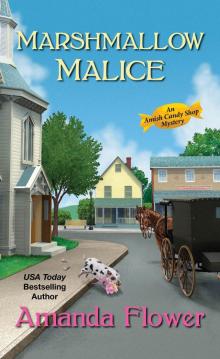 Marshmallow Malice
Marshmallow Malice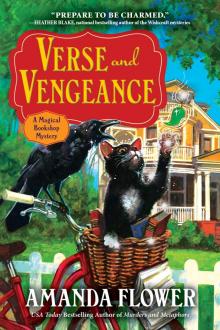 Verse and Vengeance
Verse and Vengeance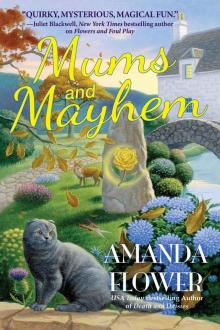 Mums and Mayhem
Mums and Mayhem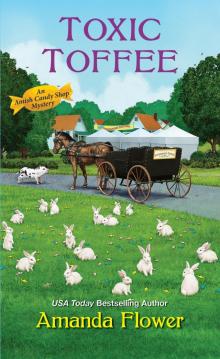 Toxic Toffee
Toxic Toffee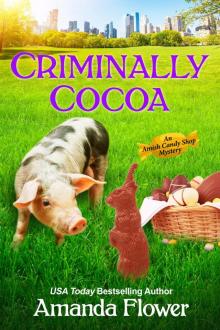 Criminally Cocoa
Criminally Cocoa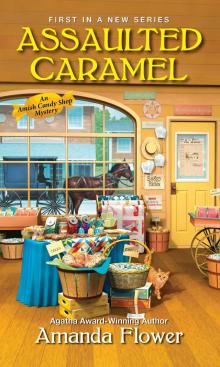 Assaulted Caramel
Assaulted Caramel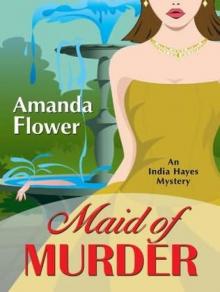 Maid of Murder aihm-1
Maid of Murder aihm-1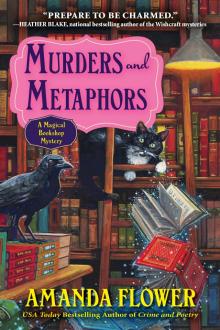 Murders and Metaphors
Murders and Metaphors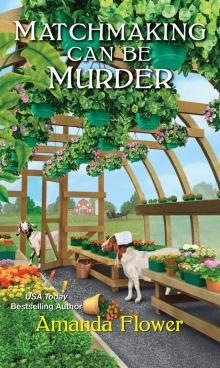 Matchmaking Can Be Murder
Matchmaking Can Be Murder Maid of Murder (An India Hayes Mystery)
Maid of Murder (An India Hayes Mystery)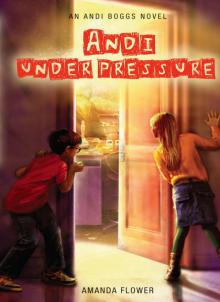 Andi Under Pressure
Andi Under Pressure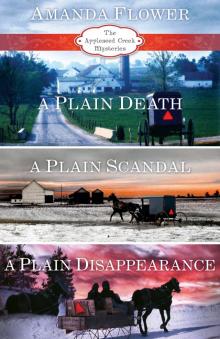 Appleseed Creek Trilogy, Books 1-3
Appleseed Creek Trilogy, Books 1-3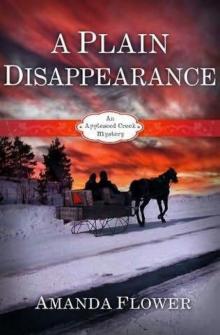 A Plain Disappearance
A Plain Disappearance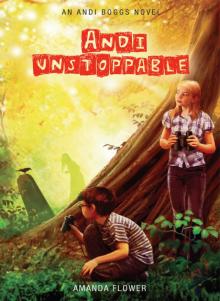 Andi Unstoppable
Andi Unstoppable The Final Vow
The Final Vow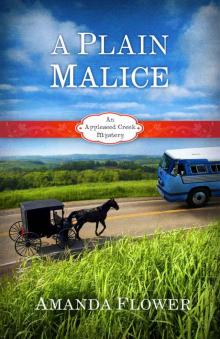 A Plain Malice: An Appleseed Creek Mystery (Appleseed Creek Mystery Series Book 4)
A Plain Malice: An Appleseed Creek Mystery (Appleseed Creek Mystery Series Book 4)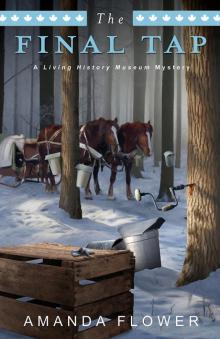 The Final Tap
The Final Tap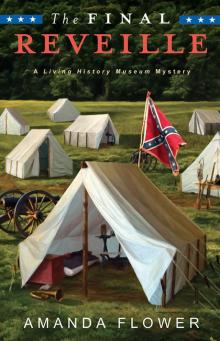 The Final Reveille: A Living History Museum Mystery
The Final Reveille: A Living History Museum Mystery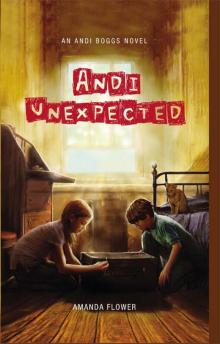 Andi Unexpected
Andi Unexpected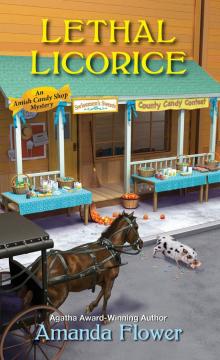 Lethal Licorice
Lethal Licorice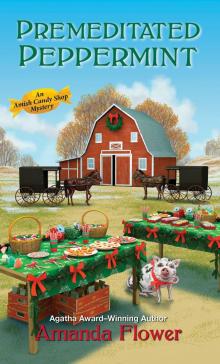 Premeditated Peppermint
Premeditated Peppermint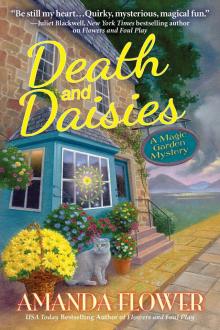 Death and Daisies
Death and Daisies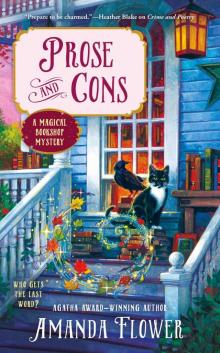 Prose and Cons
Prose and Cons